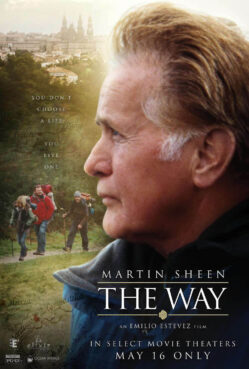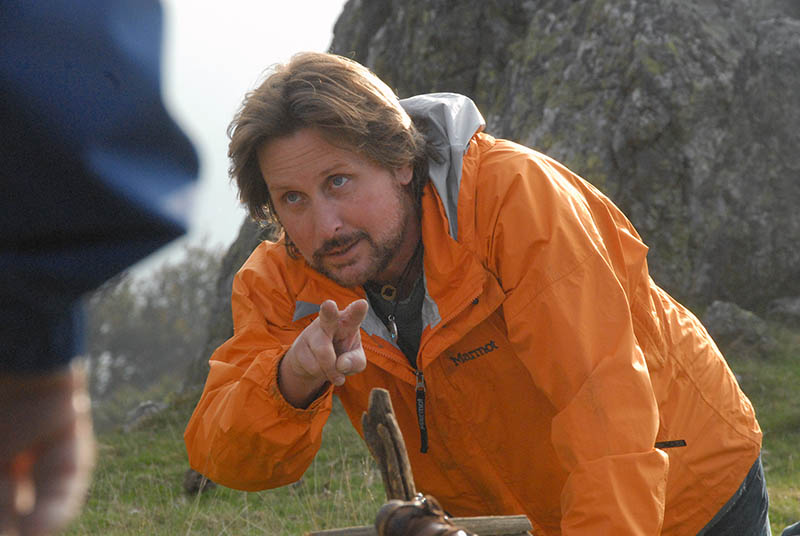
(RNS) — Emilio Estevez got the idea to make a movie about the Camino de Santiago after his father and son traveled parts of the ancient pilgrimage, which runs across Spain to the reported burial place of the apostle St. James at the Catedral de Santiago de Compostela.
His dad, actor Martin Sheen, had gotten the idea, in turn, from his dad, Francisco Estevez, who was born about 50 miles from Santiago de Compostela.
Since then, countless pilgrims have gotten the idea to make the same pilgrimage after watching “The Way,” the 2010 movie Estevez made starring Sheen as Tom, a grieving father who completes the pilgrimage after his son Daniel, played by Estevez, dies along the Camino Frances, its most popular route.
The movie returns to theaters for one night Tuesday (May 16) on nearly 1,000 screens across the country, accompanied by a conversation filmed between Estevez, Sheen and Rick Steves, who also has dedicated an episode of his travel show to the Camino.
“People are going to be able to see this not only on the big screen, but they’re going to see it in community again. They’re going to see it with fellow pilgrims and with family members,” Estevez told Religion News Service.
RELATED: Pilgrims return to Spain’s ‘El Camino’ paths after pandemic
The movie’s return to theaters comes as the Camino begins welcoming pilgrims again after the COVID-19 pandemic shut down travel.
It also comes “at a time when we need it the most,” according to Estevez.

“The Way” poster. Courtesy image
The Camino de Santiago has experienced a surge in popularity in recent years. Just last week, Estevez’s fellow Brat Packer-turned-backpacker Andrew McCarthy released his own memoir about walking the pilgrimage with his son, “Walking with Sam: A Father, a Son, and Five Hundred Miles Across Spain.”
“The Way” may have contributed to that increased interest in the ancient pilgrimage, according to Stephens Lytch, chair of the board of American Pilgrims on the Camino.
Lytch stopped short of calling “The Way” a cult classic. Nobody is coming to showings of the film dressed in pilgrim attire — hiking boots, trekking poles and backpacks decked with the traditional scallop shell marking one as a pilgrim on the Camino — like they might dress up for a screening of “The Rocky Horror Picture Show,” he said.
But, he said, the impact of the movie, which he called “a pretty good depiction” of the pilgrim experience, is undeniable.
In 2011, the year the movie first appeared in limited release in theaters, American Pilgrims on the Camino issued 1,858 credentials, a sort of pilgrim passport stamped at points along the Camino to prove one has made the journey, according to the chair of the pilgrim organization.
In 2012, after the film was released, it issued 3,570 credentials to pilgrims — a 92% increase over the previous year. In 2013, it was 5,128.
That number continued to increase until the pandemic struck in 2020, Lytch said, topping out at just over 7,000 credentials.
“I’m sure there’s a lot of pilgrims that would curse my name or blame me for not being able to find a bed or an albergue (hostel) to stay in or a restaurant to eat at,” Estevez said, laughing.
“However,” he added, “there are a lot of folks that have said, you know, ‘I never would’ve known about the pilgrimage had you not made the film and we not seen it,’ and really, over the years, that is really what’s been driving the life of the movie and sort of keeping the lights on, as it were, with this film.”
Estevez was inspired to tell the story of a father losing a son to the Camino because, he said, that was his own experience, in a way. His son, Taylor Estevez, met his now-wife while traveling along the way with Sheen and moved to Spain for a time to study.
Estevez called it “a miracle of the Camino.”

Director Emilio Estevez on the set of “The Way.” Photo courtesy The Way Productions
He made “The Way” with a small cast and crew and even smaller budget, traveling about 250 miles of the Camino Frances themselves. They got to know the Camino pretty well, he said, walking through the same village 15 or 20 times to make sure they got their shots.
By the end, he was giving other pilgrims directions, he said, laughing.
The film deals with themes of community and grief and personal transformation — themes he feels are both timely and timeless, Estevez said.
Years after the COVID-19 pandemic began, the filmmaker said, he believes there is a lot of grieving yet to do.
“I think we’ve kind of moved on instead of taking a second and that moment to reflect, and isn’t that what happens on pilgrimage? … You can’t be out there walking for 40 days and not have some sort of transformation happen in how you see the world and how you treat others,” he said.
Estevez hopes the movie will give viewers a little piece of the pilgrim experience, sparking conversations about what’s important and stressing the value of encountering the very people “that are easy to yell at and disagree with until you’re sitting across the table and sharing a meal with or having a glass of wine with.”
The fact it also has encouraged so many viewers to make their own Camino is “kind of a byproduct of having made a movie that has touched so many people and inspired so many people, and I may never make another film that does that — that inspires people to actually get off their couch and go and walk 500 miles across the north of Spain.”
It has inspired him, too, he said — not to walk the Camino de Santiago, though he longs to do it. It would be impossible to do it without being recognized, he said.
But Estevez is working on a sequel to “The Way” following Tom’s journey after completing the Camino.
As many pilgrims say, the real pilgrimage begins when the Camino ends.
RELATED: ‘I’ll Push You’: Friends, one in a wheelchair, document their Spanish pilgrimage
